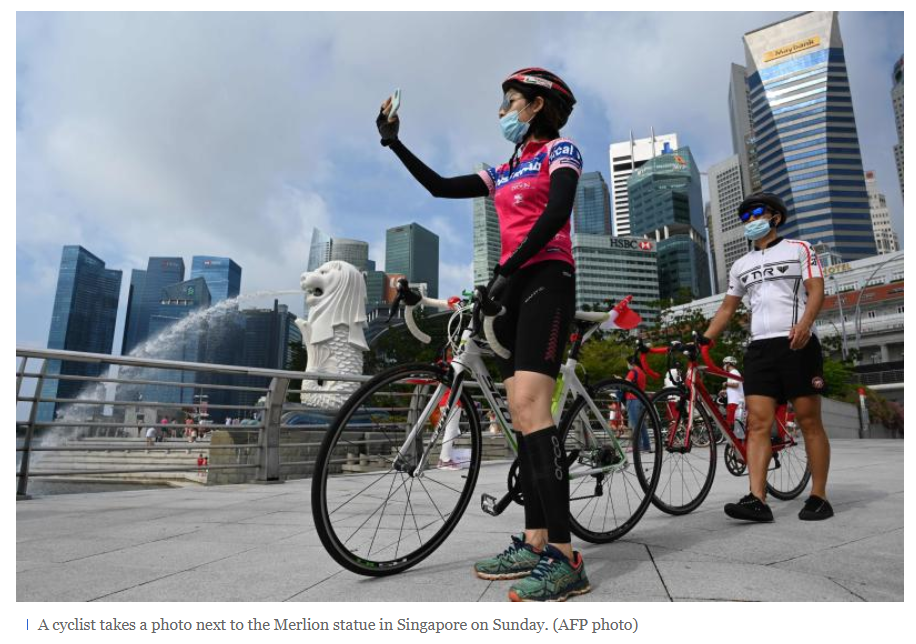Singapore sees slow recovery as economy plunges by record
Singapore’s economy suffered a bigger contraction in the second quarter than previously estimated, signalling a long recovery ahead for the trade-reliant nation.
Gross domestic product plunged a record 42.9% on an annualized basis in the second quarter from the previous three months, according to final estimates from the Ministry of Trade and Industry released Tuesday. That was worse than a previous estimate of a 41.2% contraction and compares with a forecast of -43% in a Bloomberg survey of economists.
“Recovery will be some time yet. And the recovery is not likely to be smooth,” Trade and Industry Minister Chan Chun Sing told reporters. “We can expect recurring waves of infection and disruption.”
The lockdown has pummelled retail and tourism businesses and crippled construction output, while exports have slumped because of weak global demand. Even though the economy has gradually reopened and the government has pumped in stimulus measures worth more than 19% of GDP, the outlook remains uncertain and companies are bracing for further job cuts.
The monetary policy response remains appropriate, Monetary Authority of Singapore deputy managing director Edward Robinson said in the briefing. The MAS last took unprecedented easing in late March and is scheduled to decide on policy again in October.
The economy, which is already in a technical recession, is set to shrink 5% to 7% in 2020, compared with a previous official forecast of a 4% to 7% contraction, the ministry said. On a year-on-year basis, the economy shrank 13.2% in the second quarter, compared with an earlier estimate of -12.6%.
The ministry said Singapore’s outlook weakened slightly since May, with weak external demand continuing to drag on sectors like transportation and wholesale trade. The reopening of borders is likely to be slower than previously anticipated, it added.
The data showed sharp contractions in key industries:
- Manufacturing declined an annualized 31.7% in the second quarter from the previous three months
- Construction plunged 97.1%
- Services contracted 37.4%
The quarterly figures, when annualised, show what the full-year contraction would be if the second quarter was identical to performance for all of 2020. Those annualised figures could be misleading and exaggerated, since Singapore’s mobility restrictions were most severe in the second quarter, MTI Permanent Secretary Gabriel Lim told reporters.
Singapore’s currency was 0.05% stronger at S$1.3732 against the US dollar as of 10.44am. local time.
Sectors reliant on foreign workers residing in dormitories, such as construction, will be slow to resume activity as the process to clear them for work has taken longer than expected, according to the ministry. Most of Singapore’s virus infections have been among migrant workers living in dormitories, several of which have been quarantined.
The government has ramped up its jobs support to help protect workers, including providing wage subsidies, employment opportunities in public service and traineeships. The Ministry of Manpower said in a separate release that 24,000 jobseekers took up employment and traineeships offered by the government and businesses as of the end of July.
There was some good news on the exports front. Enterprise Singapore revised its forecast for non-oil domestic exports upwards, projecting full-year growth of 3% to 5%, compared with previous expectations of a decline. Exports performed better than expected in the second quarter, due to sector-specific trends, the agency said. Non-monetary gold and pharmaceuticals, as well as electronic exports, grew in the quarter.
Singapore’s release follows reports last week that showed uneven economic performance across the region. Indonesia’s economy contracted in the second quarter for the first time in more than two decades, while the Philippines suffered its deepest plunge on record. At the same time, Chinese exports unexpectedly jumped in July amid a rekindling in global demand.
“While China will be first-in-first-out from the Covid-19 pandemic, the recent 2Q20 GDP prints from Asia generally suggest a deeper recession, and warranting more policy support in the near-term,” Selena Ling, head of treasury research and strategy at Oversea-Chinese Banking Corp, said in a report after Singapore’s release.
Source: https://www.bangkokpost.com/business/1966391/singapore-sees-slow-recovery-as-economy-plunges-by-record


 English
English




